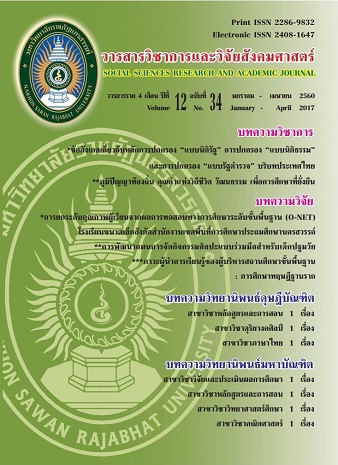ภูมิปัญญาท้องถิ่น คุณค่าแห่งวิถีชีวิต วัฒนธรรม เพื่อการศึกษาที่ยั่งยืน; Local Wisdom as the Value of Life and Culture for Sustainable Education
Main Article Content
Abstract
บทคัดย่อ
บทความนี้เป็นการนำเสนอข้อมูลภูมิปัญญาท้องถิ่นในด้านคุณค่าและความสำคัญต่อวิถีชีวิต วัฒนธรรม กระบวนการเรียนรู้และแนวทางในการนำภูมิปัญญาท้องถิ่นไปใช้ในการพัฒนาการศึกษาอย่างยั่งยืนโดยการศึกษาข้อมูลจากเอกสาร ตำราและงานวิจัยที่เกี่ยวข้อง นำมาสังเคราะห์เพื่อสรุปเป็นองค์ความรู้ พบว่า ในด้านของคุณค่าและความสำคัญต่อวิถีชีวิต วัฒนธรรมและกระบวนการเรียนรู้นั้น ภูมิปัญญาท้องถิ่นถือเป็นความรู้ที่เป็นองค์รวม โดยการรวบรวมความรู้ต่าง ๆ ให้มาสัมพันธ์กันจนเกิดมิติรอบด้าน สะท้อนความคิด ความเชื่อ ความใฝ่ฝัน ความสัมพันธ์ระหว่างคนในครอบครัว คนในชุมชนท้องถิ่นและจารีตประเพณีต่าง ๆ
ซึ่งเป็นรากฐานการดำรงชีวิตของคนในสังคมนั้น เป็นสรรพวิชาความรู้ทั้งหมดที่ชุมชนท้องถิ่นใช้แก้ปัญหา
หรือจรรโลงชีวิต ในการดำรงชีวิตของชุมชนท้องถิ่น ทำให้ชุมชนและชาติผ่านพ้นวิกฤตและดำรงความเป็นชาติหรือชุมชนไว้ได้ ส่วนแนวทางในการนำภูมิปัญญาท้องถิ่นไปใช้ในการพัฒนาการศึกษาอย่างยั่งยืนนั้น หน่วยงาน ที่เกี่ยวข้องกับการจัดการศึกษาควรจัดหลักสูตรที่มีเนื้อหา 3 ลักษณะเป็นองค์ประกอบ ได้แก่ วิชาที่เป็นสากล (Universal Content) เช่น คณิตศาสตร์ วิทยาศาสตร์ วิชาที่เป็นความรู้เกี่ยวกับชาติของตนเอง (National Content) เช่น ประวัติศาสตร์ ภูมิศาสตร์ วัฒนธรรม และวิชาที่มีเนื้อหาเกี่ยวกับท้องถิ่น (Local Content) โดยมีแนวทางการนำภูมิปัญญาเข้าสู่ระบบการศึกษาตลอดชีวิต คือ 1) ภูมิปัญญาไทยกับการศึกษาในระบบ ควรกำหนดให้โรงเรียน
มีหลักสูตรการเรียนการสอน ตำรา หนังสือประกอบ เกี่ยวกับภูมิปัญญาไทย 2) ภูมิปัญญาไทยกับการศึกษานอกระบบ ควรมีการประชาสัมพันธ์และเผยแพร่ความรู้ เกี่ยวกับเรื่องภูมิปัญญาไทยแก่นักศึกษาและประชาชนทั่วไปและ3) ภูมิปัญญาไทยกับการศึกษาตามอัธยาศัย ควรส่งเสริมให้มีแหล่งการเรียนรู้ หรือศูนย์การเรียนรู้ภูมิปัญญาไทยของผู้ทรงซึ่งองค์ความรู้ ปราชญ์ชาวบ้าน ศิลปิน/ช่างฝีมือ ฯลฯ ในท้องถิ่นรวมทั้งให้การสนับสนุนในด้านวัสดุ เครื่องมือและอุปกรณ์ต่างๆ
Abstract
This article was to present the data of local knowledge in the value and the importance of cultural learning process and to find ways of bringing local knowledge for developing sustainable education. From the research papers, textbooks and related research it was found that in terms of value, importance, culture and learning process, local wisdom is knowledge that is holistic and to gather the knowledge for relationship in the depth side. This is to echo the thoughts, beliefs, aspirations, relationships between family members, the local community, and various customsry. Other than this, local wisdom is the foundation of life of people in all societies. A complete knowledge of all the local communities have solved problems to sustain their lives. As a result, the community and the nation could overcome the crisis and maintainas a nation or as the community to continue. In the traditional approach were to develop of a sustainable education, the relevant departments of education should have three characteristics. The course contains subjects that are universal in contents such as math, science; the knowledge of their nation such as history, geography and culture with local content. The guidelines for wisdom to lifelong education includes 1) Thai wisdom in formal education system: should make the curriculum, instruction, texts and accompanying book about wisdom in Thailand. 2) The wisdom in Thailand with non-formal education: should promote and disseminate knowledge about the wisdom to the students and the general public. 3) The wisdom in Thailand with informal education: should encourage learning resources or learning center of Thai wisdom or knowledge of scholars artist /craftsman, etc. as well as providing local support in materials, tools and accessories.


